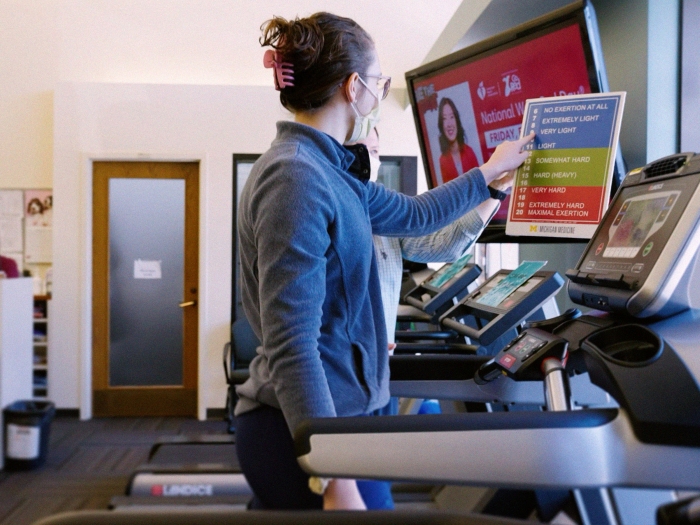More targeted efforts are needed to improve participation, researchers say
5:00 AM
Author |

For millions of Americans who have heart surgery or experience cardiovascular complications, like heart attack or heart failure, they may be encouraged to participate in cardiac rehabilitation.
The medically supervised program combines lifestyle changes, education and physical activity to help patients recover and reduce their risk of future problems.
A Michigan Medicine study now finds that people who participate in cardiac rehabilitation have a decreased risk of death years after surgery, with a trend towards better outcomes in patients who attend more sessions.
“Time and time again, cardiac rehabilitation has been shown to improve outcomes and quality of life for patients undergoing heart surgery, yet we often fall short in getting patients to attend,” senior author Michael P. Thompson, Ph.D., assistant professor of cardiac surgery at University of Michigan Medical School.
SEE ALSO: Death, hospital readmission more likely for Black patients after coronary stenting
Researchers explored over 6,400 Medicare fee-for-service claims linked to clinical registry data to assess cardiac rehabilitation use by Michigan residents after coronary artery bypass grafting, a procedure commonly called heart bypass, between 2015 and late 2019.
The surgery improves blood flow to the heart by connecting a healthy artery or vein from another part of the body to a portion of the coronary artery that is blocked.
The multicenter study concluded that patients who underwent cardiac rehabilitation after heart bypass surgery had a 3-5% absolute reduced mortality rate in the two years following the procedure. The greatest reduction in mortality was found in patients who completed 36 or more sessions, which is the recommended number for coronary artery bypass grafting patients.
“While attending any cardiac rehabilitation session was better than none at all, our data highlight that patients received a greater benefit when they attended more sessions,” Thompson said. “Focusing on both attendance and adherence to cardiac rehabilitation will benefit patients.”
The patients who tended to participate in cardiac rehab after coronary artery bypass grafting were older on average, discharged to their home more often than an extended care facility and spent less time in the hospital.
“While attending any cardiac rehabilitation session was better than none at all, our data highlight that patients received a greater benefit when they attended more sessions."
Just over half of patients attended a single session of cardiac rehabilitation, and only 12% of those patients completed all 36 sessions. This occurred despite health systems referring patients to the program 94% of the time.
“Our findings suggest that referral alone is not sufficient to ensure participation, and quality improvement efforts targeted at improving participation are needed,” said first author Tyler M. Bauer, M.D., general surgery resident at U-M Health.
SEE ALSO: Cardiac Rehab at Home Helps Patient During COVID-19 Pandemic
“The gap between cardiac rehabilitation referral and actual use needs to be closed in order to give every patient the best chance and living longer and healthier lives.”
After accounting for patient risk factors, only 5% of the variation in cardiac rehab use was attributable to the hospital at which a patient had a procedure.
In a 2022 study, Michigan Medicine researchers found that Black patients who underwent stenting or balloon angioplasty for clogged arteries were referred to cardiac rehabilitation at significantly lower rates than white patients.
Women, minorities, older adults and those with additional medical conditions are all under-referred to cardiac rehab, according to the Centers for Disease Control and Prevention.
"Minority and underserved populations face many barriers to cardiac rehab, but improving referral, attendance, and adherence in these populations may be an effective strategy to mitigating longstanding disparities in cardiovascular outcomes,” Thompson said.
Additional authors include, Temililaoluwa Daramola, M.D., Alexandra I. Mansour, Gorav Ailawadi, M.D. Francis D. Pagani, M.D., Ph.D., and Donald S. Likosky, Ph.D., all of U-M Health, Steven J. Keteyian, Ph.D, of Henry Ford Health, Jessica M. Yaser, of the Michigan Value Collaborative, and Patricia Theurer, B.S.N., of the Michigan Society of Thoracic and Cardiovascular Surgeons Quality Collaborative.
Thompson receives funding from Blue Cross Blue Shield of Michigan for his role as Co-Director of the Michigan Value Collaborative. This study was supported by a grant from the Agency for Healthcare Research and Quality (K01HS027830). Likosky reports a relationship with Agency for Healthcare Research and Quality that includes: funding grants. The opinions, beliefs, and viewpoints expressed by authors do not necessarily reflect those of AHRQ, NIH or the U.S. Department of Health and Human Services, BCBSM, or its employees.
Paper cited: “Cardiac Rehabilitation Reduces Two-Year Mortality After Coronary Artery Bypass Grafting,” The Annals of Thoracic Surgery. DOI: 0.1016/j.athoracsur.2023.05.044

Explore a variety of health care news & stories by visiting the Health Lab home page for more articles.

Department of Communication at Michigan Medicine
Want top health & research news weekly? Sign up for Health Lab’s newsletters today!





